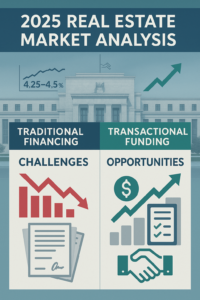The New Reality: Why 2025 Is a Pivotal Year for Transactional Funding
The transactional funding landscape is experiencing unprecedented transformation in 2025. While traditional real estate financing faces mounting challenges from interest rates maintaining a range of 4.25% to 4.5% and increasingly complex regulatory requirements, transactional funding partnerships are emerging as the ultimate solution for savvy investors and business acquirers.
Unlike conventional financing that leaves investors vulnerable to lengthy approval processes and credit-dependent limitations, transactional funding operates as a strategic joint venture partnership designed to capitalize on today’s unique market conditions. This approach allows investors to secure EMD funding and execute double close transactions without being hampered by the financial headwinds affecting traditional lending.
Bottom Line Up Front: Despite—or perhaps because of—challenging market conditions, transactional funding opportunities are expanding dramatically in 2025, with new regulatory frameworks actually creating more advantageous conditions for prepared investors.
Interest Rate Environment: The Hidden Opportunity for Transactional Funding
Current Market Dynamics
The Federal Reserve’s decision to maintain elevated interest rates has fundamentally altered the real estate investment landscape. After more than a year of maintaining high interest rates, the Federal Reserve cut its federal funds rate by 100 basis points in late 2024, down to a range of 4.25% to 4.5%. Mortgage rates dropped from their high of 7.04% in January but remain in the mid-6% range, creating a challenging environment for traditional property acquisitions. However, this scenario has inadvertently created a goldmine for transactional funding partnerships.
As economic analysts predict only two interest rate cuts in the second half of 2025, the gap between conventional financing costs and transactional funding opportunities continues to widen. This creates a competitive advantage for investors who understand how to leverage short-term joint venture partnerships effectively, as demonstrated in our business acquisition EMD fundamentals guide.
The Transactional Funding Advantage

While traditional lenders tighten their requirements and extend approval timeframes, transactional lenders provide 100% of the required funding with same-day approvals for qualified deals. This speed advantage becomes even more valuable in today’s market where:
- Motivated sellers are increasingly willing to accept fast-close offers
- End buyers are seeking alternatives to high-interest traditional financing
- Business acquisition opportunities require immediate earnest money deposits
According to recent industry analysis, transactional funding fees start at 1% or $1,000 for transactions under $500,000, making these partnerships significantly more cost-effective than the carrying costs associated with traditional financing delays.
Regulatory Landscape: New Rules Creating Fresh Opportunities
2025 Real Estate Commission Changes
The August 2024 changes to residential real estate agent commissions have fundamentally altered transaction structures, creating new opportunities for transactional funding partnerships. With buyers now responsible for their agent’s fees and mandatory written agreements required before home shopping, the market has shifted toward more sophisticated transaction structures.
This regulatory shift has actually enhanced the value proposition of transactional funding by:
- Creating more predictable closing cost structures
- Reducing unexpected fee complications in double close scenarios
- Streamlining the due diligence process for EMD funding partnerships
Compliance Advantages in the New Framework
Regulatory changes in 2025 are creating uncertainty for traditional financing options, but transactional funding partnerships operate within a more flexible regulatory framework. Since these arrangements function as joint ventures rather than traditional loans, they often bypass many of the regulatory hurdles that slow conventional financing.
Recent regulatory developments have actually strengthened the transactional funding model by:
- Establishing clearer guidelines for short-term funding partnerships
- Creating standardized documentation processes
- Reducing regulatory ambiguity around double close transactions
Geographic Market Variations: Where Opportunities Are Hottest
Regional Regulatory Differences
The impact of 2025’s regulatory changes varies significantly by geography, creating distinct opportunities in different markets. States with more restrictive lending requirements are seeing increased demand for alternative funding solutions, while markets with streamlined regulations offer faster transaction velocities.
High-Opportunity Markets:
- Texas: Streamlined regulatory environment with strong business acquisition activity
- Florida: Robust real estate market with favorable double close regulations
- Georgia: Growing wholesale market with competitive transactional funding rates
- North Carolina: Emerging market with increasing EMD funding demand
Market-Specific Advantages
EquityMax operates in 46 states with extensive partnerships with title companies, demonstrating how established transactional funding providers are expanding their geographic reach to capitalize on regional opportunities. This nationwide accessibility ensures investors can leverage transactional funding partnerships regardless of their location.
Technology and Process Evolution: The 2025 Competitive Edge
Streamlined Digital Processes
The transactional funding industry has embraced technological advancement to maintain its speed advantage. Online underwriting processes allow borrowers to apply by submitting purchase contracts, with appraisal scheduling happening within a day, dramatically reducing the time-to-funding compared to traditional alternatives.
Modern transactional funding partnerships now offer:
- Digital application processes that can be completed in minutes
- Automated underwriting systems that focus on deal viability rather than borrower credit
- Real-time communication platforms that keep all parties informed throughout the process
- Electronic document management that eliminates paperwork delays
Industry Consolidation Benefits
The private equity industry is entering a consolidation phase with rising capital concentration among megafunds, creating opportunities for smaller, more nimble transactional funding partnerships to serve overlooked market segments. This consolidation is actually benefiting individual investors by:
- Reducing competition for smaller deals
- Creating more motivated sellers seeking fast-close options
- Opening opportunities in underserved geographic markets
How This Fits Into Our Comprehensive Content Series
This market analysis represents Week 9 of our comprehensive 12-week exploration of transactional funding strategies. Our previous articles have built the foundation you need to understand today’s opportunities:
Foundational Concepts We’ve Covered:
- Week 1: The Role of EMD in Business Acquisitions: Why It Matters – Essential groundwork for understanding EMD’s critical role
- Week 8: Case Study: How a Wholesaler Scaled Fast with Assignment Fee Advances – Real-world scaling success with transactional funding
Essential Background Reading:
- Understanding Transactional Funding in Real Estate Wholesaling – Core mechanics of EMD and double close funding
- Legal Considerations for EMD in Wholesaling – Critical compliance information
- EMD Fundamentals for Wholesalers – Starter guide for new investors
Upcoming Deep Dives (Weeks 10-12):
- Alternative funding strategies when traditional EMD funding fails
- Comprehensive risk management frameworks
- Ultimate Q&A resource compilation
This systematic approach ensures investors have the complete knowledge base needed to capitalize on 2025’s unique market opportunities.
Actionable Strategies for 2025 Market Conditions
Immediate Implementation Steps
For Business Acquisition EMD Funding:
- Identify markets with regulatory advantages using our geographic analysis
- Establish relationships with multiple transactional funding partners to ensure competitive terms
- Develop standardized documentation packages to accelerate approval processes
- Create end-buyer networks to guarantee successful double close execution
For Real Estate Wholesale Double Closes:
- Leverage technology platforms for faster deal identification and processing
- Focus on motivated seller markets where speed provides maximum advantage
- Build relationships with title companies experienced in transactional funding
- Implement systematic due diligence processes to minimize partnership risks
Long-Term Strategic Positioning
The current market environment rewards investors who can adapt quickly to changing conditions. According to industry experts, companies that engage prospects early and re-engage cooled leads position themselves for success when market conditions improve.
Strategic Recommendations for 2025
The current market environment rewards investors who can adapt quickly to changing conditions. As we detailed in our wholesaler scaling case study, companies that engage prospects early and re-engage cooled leads position themselves for success when market conditions improve.
Strategic Recommendations:
- Diversify funding sources across multiple transactional funding partners
- Develop expertise in both EMD and double close applications to maximize opportunities (see our comprehensive transactional funding guide)
- Build systematic processes that can scale with improved market conditions
- Maintain detailed performance metrics to optimize partnership terms over time
- Understand legal requirements as outlined in our EMD legal compliance guide
The Bottom Line: 2025 as a Breakthrough Year
While traditional financing faces headwinds from elevated interest rates and complex regulations, transactional funding partnerships are experiencing a renaissance. The combination of regulatory clarity, technological advancement, and market consolidation has created an environment where prepared investors can execute more deals with greater efficiency than ever before.
Key Takeaways:
- Interest rate environment creates competitive advantages for transactional funding
- Regulatory changes provide clarity and streamlined processes
- Geographic variations offer targeted opportunities in specific markets
- Technology advancement enables faster, more efficient deal execution
- Industry consolidation creates opportunities in underserved segments
The investors who recognize and capitalize on these trends will be positioned to thrive regardless of broader market conditions. As we continue our series exploration of transactional funding strategies, the next article will examine alternative funding approaches for situations where traditional EMD funding becomes unavailable.
External Resources:
- Real Estate Skills’ Comprehensive Transactional Funding Guide
- Experian’s 2025 Financial Trends Analysis
- NewSilver’s 2025 Transactional Lenders Directory
- PwC’s Emerging Trends in Real Estate 2025
- Vanguard’s Investment and Economic Outlook for 2025
Ready to capitalize on 2025’s transactional funding opportunities? Continue following our series for comprehensive strategies that will position you for success in this evolving market.
Next Steps:
- Review our foundational EMD guide if you’re new to transactional funding
- Study our wholesaler scaling case study for practical implementation strategies
- Explore our complete transactional funding guide for advanced techniques
Get Started Today: 📞 Call Us: (704) 246-3802
📧 Email: info@foresightproperties.net
🌐 Learn More: Foresight Properties EMD Funding Services
